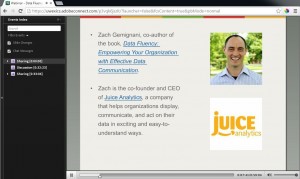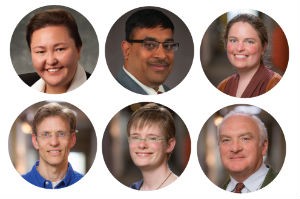
Did you miss our free webinar on March 30, 2016? Worry not. You can view it here right now, or anytime!
In this 60-minute webinar, University of Wisconsin Data Science Professor Lyna Matesi interviewed Zach Gemignani, co-author of the book, Data Fluency: Empowering Your Organization with Effective Data Communication.
Zach is the co-founder and CEO of Juice Analytics, a company that helps organizations display, communicate, and act on their data in exciting and easy-to-understand ways. Zach and his brother, Chris, co-authored Data Fluency, which Dr. Matesi’s students use in her course, DS 735: Communicating About Data.
Talking About Data Science
The conversation between Professor Matesi and Zach focused on what it takes to create a data-fluent culture in any organization. Specifically:
- What is the Data Fluency Framework, why it is useful, and what inspired it.
- Some important lessons Zack has learned from past mistakes in producing and sharing data products.
- How long it takes to build a data-fluent organization.
- Ways Zach has overcome cynicism about how data is presented.
- Which is more lucrative: taking a job as a data scientist or starting your own firm.
By all accounts, the webinar was a big success. UW Data Science Program Manager David Summers said, “This event was great. About 40 participants joined the webinar. Lyna and Zach had a good conversation and answered questions from the audience. From everything I have heard, people found it interesting and valuable. So stay tuned. We plan to offer more of these events in the future!”
View the recorded webinar now.
About Juice Analytics
Juice Analytics was founded in 2005 because brothers Zach and Chris saw a problem in the marketplace. Organizations were working hard to analyze and disseminate data, but they were not delivering the “last mile” in data visualization—where data actually creates better decisions. Juice Analytics is tackling this problem head on.
To find out more, visit:
Are you looking to start or advance your career in data science? Find out why the online UW Master of Science in Data Science is a great program for aspiring and established data professionals. Call 608-800-6762 or email learn@uwex.wisconsin.edu to discuss your options with an enrollment adviser today.





